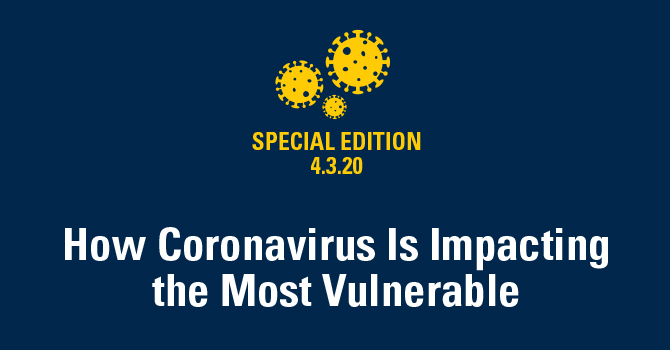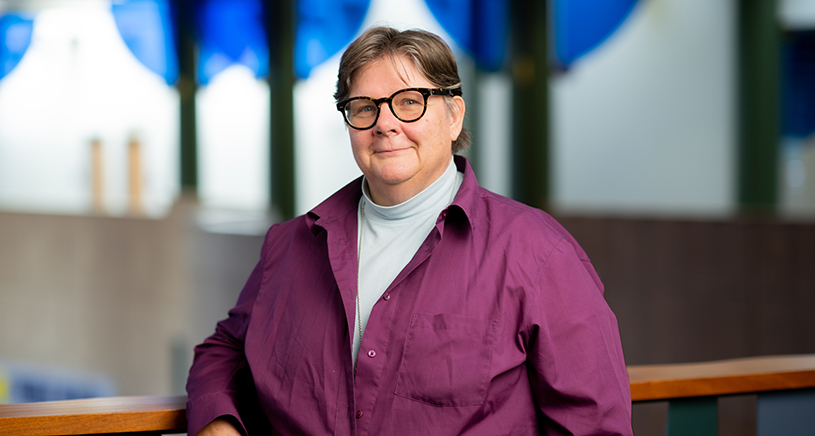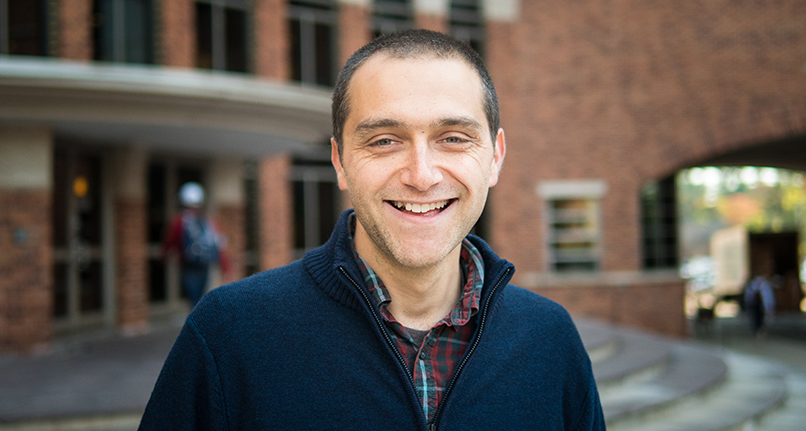How Coronavirus Is Impacting the Most Vulnerable

Right now, the coronavirus pandemic and the measures we’ve undertaken to stop it are reshaping how millions of people live, work, learn, and manage their health. Though these measures bring difficult new challenges for each of us, for vulnerable populations like the elderly, those with chronic illness and mental health issues, and those without the means to work from home or access affordable healthcare, they can have life-threatening consequences.
Listen to "How Coronavirus Is Impacting the Most Vulnerable 4.3.20" on Spreaker.
|
Subscribe and listen to Population Healthy on Apple Podcasts, Spotify, Google Podcasts, iHeartRadio, YouTube or wherever you listen to podcasts! Be sure to follow us at @umichsph on Twitter, Instagram, and Facebook, so you can share your perspectives on the issues we discussed, learn more from Michigan Public Health experts, and share episodes of the podcast with your friends on social media. |
Speaker 1: Right now, the coronavirus pandemic and the measures we've undertaken to stop it are reshaping how millions of people live, work, learn and manage their health. At the time of this recording, nationwide shut downs and stay-at-home orders have been extended in countries across the globe, until the end of April, and they could extend well into the summer months. Though these measures bring difficult new challenges for each of us, for vulnerable populations like the elderly, those with chronic illness or mental health illness, and those without the means to work from home or access affordable health care, they can have life-threatening consequences.
Hello and welcome to Population Healthy, a podcast from the University of Michigan School of Public Health. This episode as part of a series of special editions of our podcast, focusing on the ongoing coronavirus pandemic. Sharon Kardia is a professor of epidemiology and the Associate Dean for Education at the University of Michigan School of Public Health. We asked her to talk about the ways pandemics like the coronavirus outbreak can affect vulnerable populations.
Kardia: One of the things that we know is that outbreaks like this are gonna have a differential effect on people based on what resources that they have or don't have. So for particularly vulnerable populations. So you can imagine people that are older than 70 living alone and they don't really actually have enough support as it is in many cases to navigate a significant illness but a pandemic is gonna be very difficult. How are they gonna actually be able to get the news, get social contact and get the health care that they need, especially if they're, for instance, in a rural setting where a long distance to go? And there may not be a lot of people that are actually checking in on those individuals. They would be very susceptible to having a severe case and not being able to navigate that well.
We can also think about people whose work puts them in much more closer proximity to a lot of individuals. For instance, those people that are in the service sector. Right now, one of the things that's happened is people have shut down restaurants and bars in many ways because they don't want either the people visiting those establishments to get sick, but then also the people that are serving them would be a very high risk.
We could also imagine individuals that have pre-existing conditions. You can think of any of the pre-existing conditions like cardiovascular disease, diabetes, hypertension, that makes the body already strained. An infection might actually tip over into a much more severe case because of those conditions. People with mental health struggles with sort of heightened anxiety and fear and uncertainty, could trigger and re-traumatized many individuals, leading them to make decisions about what they do or how they navigate their own particular health. Their self-observation could be basically something that they either try to mask with substances or they're trying to navigate it and to take care of themselves, but it actually ends up putting them at even higher risk of a mental health crisis or an infectious disease crisis.
Speaker 1: In interviews with the National Geographic and The New York Times, assistant professor of epidemiology Jon Zeller, has called the coronavirus pandemic a “litmus test for inequality”. He spoke to us about the ways pandemics like this one can fundamentally amplify inequalities and what measures we’ll need to take to address them in the face of future pandemics.
Zellner: I think the way that you can think about the impact of a pandemic, but let's say specifically this one, (because unfortunately infectious diseases are sort of like snowflakes in the sense that each one is unique and particular in its own ways) one of the things we're seeing here is that your social position matters for whether you can avoid exposure. So what kind of job do you have? Can you work from home? Can you afford to not work all together? Can you afford to take the time to watch your kids? Do you have that kind of job security or do you have to go continue delivering Amazon packages or continue working in the supermarket and doing these things that are kind of keeping the world functioning at whatever level, while clearly increasing your own personal risk and not to mention straining your personal resources, right?
So we don't know necessarily at this moment, whether folks who are in these positions are more likely to get infected but it's hard to believe that that's not the case. And some of them being evidence from Amazon warehouses where you're having outbreaks of cases. Certainly among healthcare workers would suggest that the people who don't have a chance, or a choice to stay away and stay home are gonna be at greater risk and those are gonna be folks by in large, not exclusively, who don't have the social power and economic means to stay home and stay safe. So I think that's number one. Number two is what happens to you once you're exposed.
Well, do you have underlying health conditions? Do you have cardiovascular disease? Do you have diabetes? Are they well-managed if you do have them? That's gonna impact the clinical course of your disease. And then the kind of insurance and access to healthcare. And we know that race and socioeconomic status impact the way people are treated by healthcare providers beyond just the barrier to access that people of color and lower income people face. And so maybe the quality of care you’re going to get isn't going to be quite as good, and so you may not live or you may just have a poorer outcome.
Right now we're seeing that each step of the chain really touches on these issues of inequality. No part of it is untouched. And of course, we'll see what it all looks like unfortunately when it's over. But one thing I wish is that we obviously had been more prepared for this kind of emergency, but also that we'd been thinking about these ideas before something like this happens. But that requires a different perspective on whose responsibility it is to mitigate this kind of harm. And with the absence of a more universal healthcare system, ultimately what you see is this kind of fragmentary response that ultimately benefits the wealthy at the expense of people who are not wealthy, or poor. When I say it’s a litmus test for inequality, I mean it just exposes every possible dimension in the starkest possible terms which is really is like life and dealth or at least like life and severe illness.
When we talk about social distancing, one of the things that I think is just really important to remember is that social distancing, it’s this thing that we've gotta do right now, even though this term, I've heard so many times I just kinda wanna tear my hair out every time I hear it. It's this important concept, it’s this thing we should be doing to kinda slow things down, flatten the curve, what have you, but not everybody has the choice, right?
And we devolved all of those things down to personal behavior like you should stay six feet way, you should not sneeze on the cucumbers, and all of these things. I think we would be wiser to think about the reasons that people can or can't do these things or do or do not listen to these messages. The dire situation is a structural failure from the top to the bottom and now it's on the heads of individuals to shoulder the burden. And I would hope if there’s any positive upshot of this, it's that we understand my risk is dependent upon your risk.
So that's not quite the same as heart disease or cancer that are not caused by infectious agents. Obviously, they're common risks there but me having heart disease does not magically make you more likely to have it. Whereas obviously this does do that, right? And so, the wealthy flee the poor and don't open the door to receive their packages and all these kind of things really kind of point out the way inequality works in terms of who is exposed to whom and who gets to choose who they're exposed to.
You could talk about social distancing, both in terms of the physical distance between us, but also the kind of metaphorical social distance, in terms of what we are able to choose to do or what risks we’re forced to shoulder in order to stay in our homes and to keep our jobs and all those things.
Speaker 1: We've seen cases of coronavirus rising quickly in big cities like New York, and Seattle, and in Detroit, which is just 40 miles to the east of Ann Arbor. We asked Zellner for his perspective on why this might be happening.
Zellner: I find this question of what made New York more susceptible than another place kind of difficult to answer because different places are in different from points on this trajectory. There’s a strong possibility that this virus has been bumping around a number of places for quite a while and then at some point, particularly as the flu season sort of fades and early cases could have been kind of lost in the noise of all these other respiratory infections that were bumping around towards the end of the winter. And so it may take places by surprise, but you know you see in the Detroit area, we were kind of bumping along, just beating the average to some extent. By now in the recent days, the number of cases have ticked up. And it's a little hard to say from those numbers what's going on because you also don't know how the testing is being deployed, who is being tested, where they’re being tested, are they tested in the community, or are they tested in a clinical setting? So that's, I think, gonna be a question we have to answer after rather than right now. I could speculate about population density and all these things but I think we don't know. And I'm not convinced that density is in and of itself a driver of explosive outbreak risk because many Chinese cities that didn't have the explosive graph that New York has had are much denser or as dense at least. Tokyo is incredibly dense and up to this point has not had widespread transmission, but it could happen. So I think in a year, we’ll kind of get a feel for what actually happened here. But I think the story is still being written.
Something will always happen. There will be another disaster. There will be another pandemic. We don't know what the thing will be, but it's an eventuality that these kind of things that expose our mutual dependence and our frailty as a group will come and rear their heads, and I don't know what the next thing will look like. We can just put our hands over our eyes pretending things aren't gonna happen, doesn't mean that they won't. The response to this has been this kind of reality avoiding market-focused thing that completely devalues individuals, particularly those who can't sort of buy their way out of the problem.
One of the things a pandemic like this shows you is that you can't do a very good job if what you're doing is you're just responding, right? In order to be ready for these things, you have to think about them in advance. You have to be ready to act when the time comes. You have to think about how all these different segments of the population are gonna be affected by different things. You have to be thinking about these kinds of things from the get-go, and be ready to act on them.
Speaker 1: This has been a special edition of Population Healthy, a podcast from the University of Michigan School of Public Health. During the ongoing coronavirus pandemic, we’ll work to bring you analysis from our community of experts to help you understand what this public health crisis means for you. To stay up-to-date in between special edition episodes, be sure to check out our website publichealth.umich.edu, subscribe to our Population Healthy newsletter at publichealth.umich.edu/news/newsletter and follow us on Twitter, Instagram, and Facebook @umichsph.
In This Episode
 Sharon Kardia
Sharon Kardia
Professor of Epidemiology and Associate Dean for Education at the University of Michigan School of Public Health
Sharon Kardia is a Professor of Epidemiology and Associate Dean for Education at the University of Michigan School of Public Health. Her main research interests are in the genetic epidemiology of common chronic diseases and their risk factors. She is particularly interested in gene-environment and gene-gene interactions and in developing strategies to understand the complex relationship between genetic variation, environmental variation, and risk of common chronic diseases. Learn more.
 Jon Zelner
Jon Zelner
Assistant Professor of Epidemiology at the University of Michigan School of Public
Health
Jon Zelner is a social epidemiologist focused on understanding and targeting the joint
social and biological drivers of infectious disease risk. His work blends theory and
methods from sociology and epidemiology, with an emphasis on the development and use
of novel computational and statistical methods for integrating social and biological
data. Learn more.
